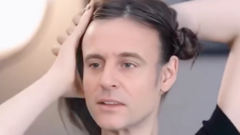Following the deaths of four teenagers believed to be linked to the TikTok "blackout challenge," parents are taking legal action against the platform, claiming it fosters dangerous behaviors through its addictive design, prompting calls for greater awareness of social media risks.
Parents Sue TikTok After Tragic Deaths of Teens Linked to Viral Challenge

Parents Sue TikTok After Tragic Deaths of Teens Linked to Viral Challenge
The lawsuit, filed by the parents of four British teenagers, alleges TikTok's design contributed to their children's deaths from the "blackout challenge."
TikTok is now facing legal action after the parents of four British teenagers, who reportedly died participating in viral challenges on the platform, filed a lawsuit. This legal challenge, initiated by the Social Media Victims Law Center, alleges that the teens—Isaac Kenevan, Archie Battersbee, Julian "Jools" Sweeney, and Maia Walsh—lost their lives in connection with the so-called "blackout challenge" in 2022.
The lawsuit, submitted to a Delaware court, argues that ByteDance, TikTok's parent company, has intentionally created an addictive platform structure that drives children towards increasingly dangerous behaviors. According to the complaint, these tragedies were not just random occurrences, but foreseeable results of the platform's design choices aimed at maximizing user engagement.
In response to the lawsuit, TikTok noted its commitment to prohibiting harmful content, having previously blocked searches for the "blackout challenge" and directed users to its Safety Centre. The social media giant asserts it has been vigilant in tackling dangerous trends, but several families disagree, voicing concerns over the platform’s overall impact on young users.
Ellen Roome, whose son Jools is among the deceased, has been advocating for "Jools' Law," which would allow bereaved parents access to their children’s social media accounts. She shared her belief that many parents underestimate the potential dangers on platforms like TikTok, emphasizing the necessity for greater awareness. Roome expressed frustration at TikTok’s refusal to provide data posthumously, deeming it morally wrong.
Echoing Roome's sentiments, Leanda Barrington-Leach, from the 5Rights Foundation, remarked on the need for tech companies to prioritize children's safety over profits, linking this tragic situation to systemic issues within social media's operational frameworks.
Despite TikTok’s assertions of enhanced content monitoring, critics point out that the platform has faced numerous legal challenges related to harmful content and its role in tragic incidents among minors. A notable case includes a prior lawsuit involving a ten-year-old who died following her participation in the same challenge, highlighting the urgent need for potential reforms in social media safety regulations.
As discussions continue regarding the potential future of TikTok, including possible restrictions and buyout options in the US, the conversation surrounding parental control, digital safety, and corporate responsibility remains at the forefront of this ongoing debate.





















